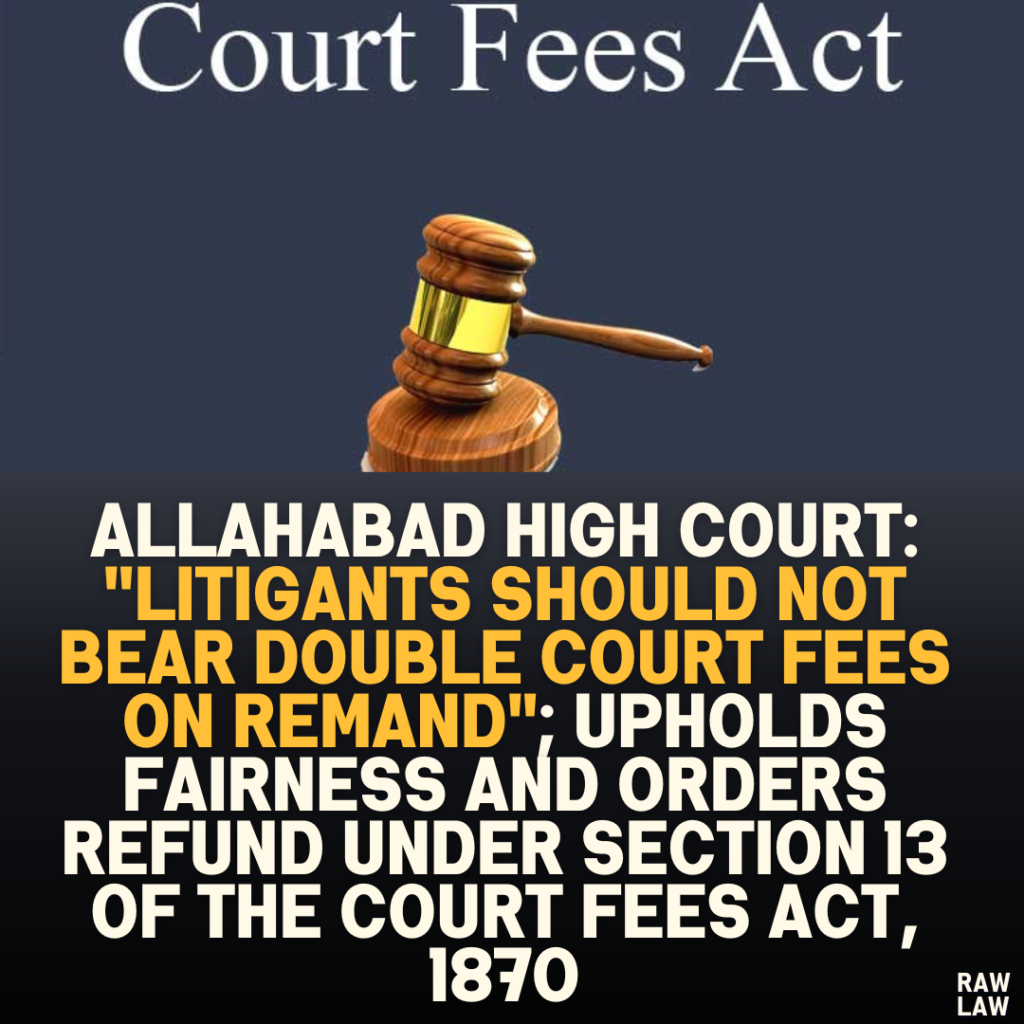Court’s Decision
The Allahabad High Court allowed the appeal, overturning the trial court’s rejection of the plaint due to non-payment of ad valorem court fees. The court held that the appellants, having deposited the requisite court fees during the appeal process, are not required to pay court fees again when the matter is remanded to the trial court.
The High Court directed the Collector to refund ₹2,27,000/- paid as court fees for the appeal within two weeks, using the judgment as a certificate for refund under Section 13 of the Court Fees Act, 1870. The matter was remanded to the trial court for adjudication on merits.
Facts
- Initial Proceedings:
The trial court rejected the plaint under Order VII Rule 11 CPC due to the appellants’ failure to deposit ad valorem court fees, despite earlier directions. - First Appeal:
In their appeal, the appellants deposited the full court fees as determined by the trial court but requested that these fees be treated as sufficient for the trial court proceedings upon remand. - Legal Issue:
The appellants argued that under Section 13 of the Court Fees Act, they should not be required to pay court fees multiple times for the same suit.
Issues
- Whether plaintiffs are required to deposit court fees again in the trial court after the matter is remanded by the appellate court.
- Whether Section 13 of the Court Fees Act, 1870 entitles the appellants to a refund of court fees paid on the memorandum of appeal.
Petitioner’s Arguments
- Statutory Interpretation:
The appellants argued that Section 13 of the Court Fees Act prevents litigants from paying court fees multiple times for the same suit. - Judicial Precedents:
They relied on:- Chandra Bhushan Misra v. Jayatri Devi (AIR 1969 All 142), where the court held that litigants are entitled to refunds when a suit is remanded.
- State of U.P. v. Chandra Bhushan Misra (AIR 1980 SC 591), where the Supreme Court upheld the Allahabad High Court’s Full Bench decision.
- Fairness in Litigation:
The appellants contended that requiring additional court fees post-remand imposes an unjust financial burden.
Respondent’s Arguments
- No Erroneous Decision:
The respondents argued that the trial court’s earlier decision on valuation and payment of court fees was not erroneous and therefore does not warrant relief under Section 13. - Limited Applicability of Precedent:
They emphasized that the Chandra Bhushan Misra judgment only applies when there is an “erroneous decision” by the trial court, which was not the case here.
Analysis of the Law
- Section 13 of the Court Fees Act:
The provision mandates a refund of court fees when:- A rejected plaint is received by a higher court.
- A suit is remanded for a second decision by the trial court.
- Relevant Precedents:
- Chandra Bhushan Misra v. Jayatri Devi:
The Full Bench held that Section 13 intends to relieve litigants from paying court fees multiple times in appeals and retrials. - Suresh Kumar Chowkse v. State of Madhya Pradesh (1985 MPLJ 758):
The Madhya Pradesh High Court ruled that appellate courts must grant a refund certificate for court fees when a case is remanded for a complete retrial.
- Chandra Bhushan Misra v. Jayatri Devi:
- Principle of Equity:
The court emphasized that litigants should not face “double jeopardy” by paying court fees twice for seeking justice.
Precedent Analysis
The High Court extensively referred to the principles established in Chandra Bhushan Misra and Suresh Kumar Chowkse. Both cases underscored the importance of avoiding financial penalties on litigants for procedural remands.
Court’s Reasoning
- Nature of Remand:
The court clarified that Section 13 applies regardless of whether the remand was procedural or substantive. - Equity and Justice:
Requiring additional court fees would contradict principles of equity, as litigants would effectively pay twice for a single adjudication. - Mandatory Refund:
The court found that appellants are statutorily entitled to a refund of court fees paid in the appeal, which would otherwise lead to an unjust financial burden.
Conclusion
The court allowed the appeal and remanded the case to the trial court for adjudication on merits. The judgment was treated as a certificate under Section 13 of the Court Fees Act, authorizing the appellants to receive a refund of ₹2,27,000/- in court fees within two weeks.
Implications
This judgment reinforces the principle of fairness in litigation, ensuring that litigants are not unduly penalized with financial burdens for procedural remands. It provides clarity on the application of Section 13 of the Court Fees Act and serves as a guiding precedent for similar cases.
